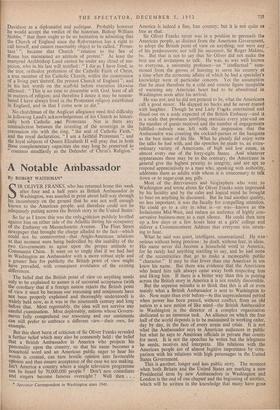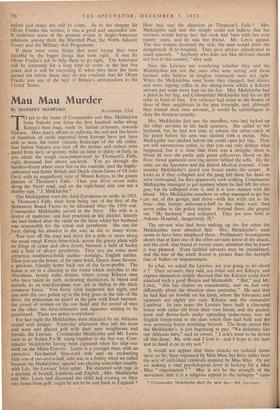A Notable Ambassador
By ROBERT WAITHMAN* S' IR OLIVER FRANKS, who has returned home this week after four and• a half years as British Ambassador in Washington, was assailed in print about half-way through his incumbency on the ground that he was not well enough known to the American people, and therefore could not be adequately putting across the British story in the United States.
So far as I know this was the onlykriticism publicly levelled against him on either side of the Atlantic during his occupancy of the Embassy on Massachusetts Avenue. The Fleet Street newspaper that brought the charge alluded to the fact—which could not be controverted—that Anglo-American relations at that moment were being bedevilled by the inability of the two Governments to agree upon the proper attitude to Communist China. It went on to imply that if we had had in Washington an Ambassador with a more robust style and a greater flair for publicity the British point of view might have prevailed, with consequent avoidance of the existing differences. , Thp belief that the British point of view on anything needs only to be explained to assure it of universal acceptance (with the corollary that if a foreign nation rejects the British point of view it must be because our reasoning and sentiments have not been properly explained and thoroughly understood) is Widely held now, as it was in the nineteenth century and long before that. Most regrettably, the idea will not survive any careful examination. Most deplorably, nations whose Govern- ments fully comprehend our reasoning and our sentiments can still prefer to embrace a different view—their own, for example. _ But this short burst of criticism of Sir Oliver Franks revealed a further belief which may also be commonly held : the belief that a British Ambassador in America who projects his Personality upon the country, so that his name becomes a household word and an American public eager to hear his Words is created, can turn hostile opinion into favourable Opinion and thus ensure acceptance ofthe case we are making. Isn't America a country where a single television programme can be heard by 70,000,000 people ? Don't new comedians and singers become famous overnight ? Well then * Spectator Correspondent in Washington since 1949. America is indeed a fine, free country; but it is not quite as free as that.
Sir Oliver Franks never was in a position to persuade the American people, as distinct from the American Government, to adopt the British point of view on anything; nor were any of his predecessors; nor will his successor, Sir Roger Makins, be. But that is not to say that Sir Oliver did not make the best use of invitations to talk. He was, as was well known to everyone, a university professor—an " intellectual " sum- moned from the groves of learning to serve his country at a time when the economic affairs of which he had a specialist's knowledge were of particular concern. Yet the assumption that he must therefore be a cold and remote figure incapable of warming any American heart had to be abandoned in Washington soon after his arrival. .
He was not, and he did not pretend to be, what the Americans call a good mixer. He slapped no backs and he never roared with laughter. Though he and Lady Franks entertained and dined out on a scale expected of the British Embassy—and it is a scale that produces terrifying statistics every year-end on the number of guests received and the number of engagements fulfilled—nobody was left with the impression that the Ambassador was counting the cocktail-parties or the banquets as the best times of his life. What he plainly did enjoy were the talks he had with, and the speeches he made to, an extra- ordinary variety of Americans, of high and low estate, in almost every one of the forty-eight States. And whatever appearances there may be to the contrary, the Americans in general give the highest priority to integrity, and are apt to respond appreciatively to a man who, speaking with authority, addresses them as adults with whom it is unnecessary to talk down or to sugar-coat any pills. Most of the interviewers and biographers who went to Washington and wrote about Sir Oliver Franks were impressed by his lucidity and by the calm and logical mind he brought to bear on anything he discussed. But he had another quality. no less important; it was the faculty for compelling attention. He could go to a city in what is—or was—known as the Isolationist Mid-West, and reduce an audience of highly con- servative business-men to a rapt silence. He could then turn up a few days or a few hours later at a girls' college and deliver a Commencement Address that everyone was strain- ing to hear.
What he said was quiet, intelligent, unsensational. He was serious without being precious : he dealt, without fear, in ideas.
His name never did , become a household word in America, for he rarely had anything startling to say, and he had none of the eccentricities that go to make a memorable public 4" character." It' may be that fewer than one American in ten knew his name. But there was evidence that the Americans who heard him talk always came away both respecting him and liking him. If there is a better way than this in putting across the British story in America it is not readily discernible. But the supreme mistake is to think that this is all or even mainly what a British Ambassador is sent to Washington to do. Now more than ever before—in this unprecedented period when power has been passed, without conflict, from an old nation to a new nation of like mind—the British Ambassador in Washington is the director of a complex organisation dedicated to an immense task. An alliance on which the free half of the world depends is to be maintained in working order, day by day, in the face of every strain and crisis. It is not what the Ambassador says to American audiences in public but what he says to American officials in private that counts for most. It is not the speeches he writes but the telegrams he sends, receives and interprets. His relations with the American people are of almost fugitive importance by Com- parison with his relations with high personages in the United States Government.
This is another, longer and less public story. The moment when both. Britain and the United States are marking a new Presidential term by new Ambassadors in Washington and London is the end of one chapter and the beginning of another, which will be written in the knowledge that many have gone before and many are still to come. As to the chapter Sir Oliver Franks has written, it Was a good and successful one. It enshrines some of the greatest events in Anglo-American relations, among them the Marshall Plan, the North Atlantic Treaty and the Military Aid Programme.
If there were some things that went wrong they were dwarfed by the bigger things that went right. It was Sir Oliver Franks's job to help them to go right. The historians will be interested for a long time to come in the last five years, and it will be surprising if, when they have the facts spread out before them, they do not condlude that Sir Oliver Franks was one of the best of Britain's ambassadors to the United -States.



















































 Previous page
Previous page